Unit 11 Meetings and Negotiations
- 格式:ppt
- 大小:3.56 MB
- 文档页数:91
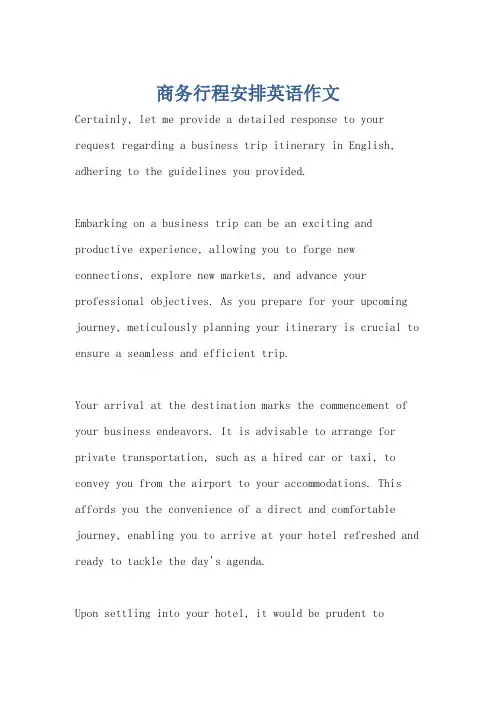
商务行程安排英语作文Certainly, let me provide a detailed response to your request regarding a business trip itinerary in English, adhering to the guidelines you provided.Embarking on a business trip can be an exciting and productive experience, allowing you to forge new connections, explore new markets, and advance your professional objectives. As you prepare for your upcoming journey, meticulously planning your itinerary is crucial to ensure a seamless and efficient trip.Your arrival at the destination marks the commencement of your business endeavors. It is advisable to arrange for private transportation, such as a hired car or taxi, to convey you from the airport to your accommodations. This affords you the convenience of a direct and comfortable journey, enabling you to arrive at your hotel refreshed and ready to tackle the day's agenda.Upon settling into your hotel, it would be prudent tofamiliarize yourself with the local area, identifying key landmarks, restaurants, and any other amenities that may prove useful during your stay. This information can be obtained from the hotel concierge or through a quick online search, ensuring you are well-equipped to navigate your surroundings with ease.The primary purpose of your business trip is, of course, to attend scheduled meetings and negotiations. It is crucial to meticulously plan the timing and locations of these engagements, factoring in potential traffic delays, the need for breaks, and the potential for impromptu discussions that may arise. By allocating sufficient time between appointments, you can ensure a smooth flow to your day, minimizing the risk of tardiness or feeling rushed.In addition to your formal business commitments, it is recommended to allocate time for networking andrelationship-building. Identify any industry events, receptions, or social gatherings that may be occurring during your stay and make efforts to attend. These informal settings can provide valuable opportunities to connect withprospective clients, partners, or industry influencers, ultimately expanding your professional network and strengthening existing relationships.When it comes to dining, it is advisable to research local restaurants that cater to business clientele, offering an appropriate ambiance and menu selection for conducting meetings or entertaining guests. Reserving tables in advance can help ensure the availability of suitable accommodations, particularly during peak dining hours.Throughout your trip, it is essential to maintain open and clear communication with your colleagues or superiors back home. Provide regular updates on your progress, any notable developments, or any challenges you may encounter. This transparency not only demonstrates your commitment to the task at hand but also allows your team to provide timely support or guidance as needed.Upon the conclusion of your business engagements, it is prudent to allocate time for personal exploration and relaxation. Whether it's visiting local landmarks,indulging in the local cuisine, or simply taking a leisurely stroll, providing yourself with this opportunity can help recharge your batteries and prepare you for the journey home.As you embark on your business trip, remember to remain flexible and adaptable. Unexpected situations may arise, and the ability to navigate them with grace and professionalism can be the hallmark of a successful business traveler. By meticulously planning your itinerary and anticipating potential obstacles, you can position yourself for a productive and rewarding experience, one that advances your professional objectives and strengthens your global business acumen.。
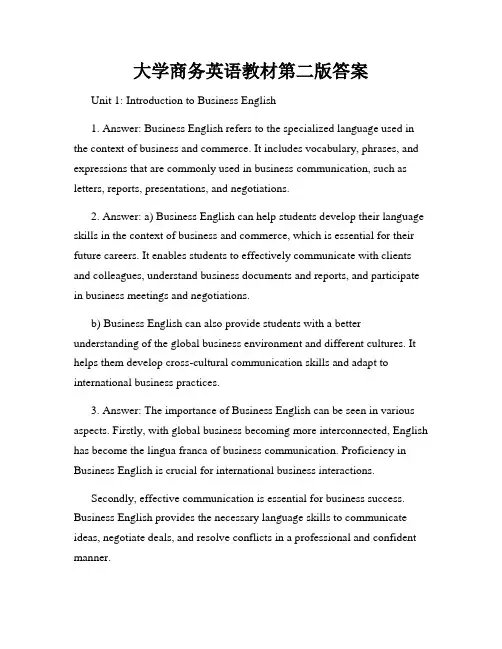
大学商务英语教材第二版答案Unit 1: Introduction to Business English1. Answer: Business English refers to the specialized language used in the context of business and commerce. It includes vocabulary, phrases, and expressions that are commonly used in business communication, such as letters, reports, presentations, and negotiations.2. Answer: a) Business English can help students develop their language skills in the context of business and commerce, which is essential for their future careers. It enables students to effectively communicate with clients and colleagues, understand business documents and reports, and participate in business meetings and negotiations.b) Business English can also provide students with a better understanding of the global business environment and different cultures. It helps them develop cross-cultural communication skills and adapt to international business practices.3. Answer: The importance of Business English can be seen in various aspects. Firstly, with global business becoming more interconnected, English has become the lingua franca of business communication. Proficiency in Business English is crucial for international business interactions.Secondly, effective communication is essential for business success. Business English provides the necessary language skills to communicate ideas, negotiate deals, and resolve conflicts in a professional and confident manner.Thirdly, business documents and reports are commonly written in English. Understanding and producing well-written business communication is crucial for exchanging information accurately and efficiently.Unit 2: Business Communication1. Answer: Business communication refers to the exchange of information, ideas, and messages within a business environment. It includes both internal communication within an organization and external communication with clients, customers, and other external stakeholders.2. Answer: a) Written communication: This includes business letters, emails, memos, reports, and other written documents. Written communication allows for a formal and documented exchange of information, ensuring clarity and accuracy.b) Oral communication: This includes face-to-face conversations, phone calls, video conferences, and presentations. Oral communication allows for immediate feedback and enables non-verbal cues such as body language and tone of voice to convey messages.c) Non-verbal communication: This includes gestures, facial expressions, posture, and other non-verbal cues. Non-verbal communication can greatly impact the effectiveness of a message and is particularly important in cross-cultural communication.3. Answer: Effective business communication is crucial for various reasons. It helps build relationships and trust among colleagues, clients, and stakeholders. Clear and concise communication ensures that everyoneunderstands their roles and responsibilities and avoids misunderstandings or errors.Furthermore, effective business communication saves time and resources by minimizing unnecessary back-and-forth communication and ensuring that tasks are completed efficiently. It also enhances the professional image of individuals and organizations.Unit 3: Business Writing1. Answer: Business writing refers to the specific writing style and techniques used in the context of business communication. It aims to communicate information, ideas, or messages clearly, concisely, and professionally.2. Answer: a) Clarity: Business writing should be clear and easy to understand. It should avoid unnecessary jargon, acronyms, or technical terms that may confuse the reader. Use simple and concise language to convey the message.b) Conciseness: Business writing should be concise and to the point. Avoid lengthy sentences or paragraphs and eliminate unnecessary information. Use bullet points or headings to organize information effectively.c) Professional tone: Business writing should maintain a professional and formal tone. Avoid using slang, colloquial language, or informal expressions. Use proper grammar, punctuation, and spelling.d) Audience awareness: Consider the needs and expectations of the target audience when writing. Adapt the writing style and tone accordingly to ensure the message is well-received.3. Answer: Good business writing skills are essential as they contribute to effective communication in a professional setting. Well-written business documents instill confidence and convey credibility to clients, stakeholders, and colleagues. Clear and concise writing ensures that messages are understood accurately and reduces the risk of miscommunication or misunderstandings.In addition, well-written business documents facilitate decision-making and help in the planning and execution of business strategies. Whether it is a business proposal, a report, or an email, strong business writing skills are crucial for success in the business world.(Note: This is a sample response and the actual answers may vary depending on the specific content of the textbook.)。
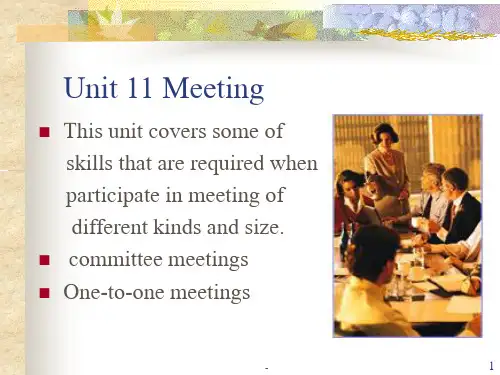
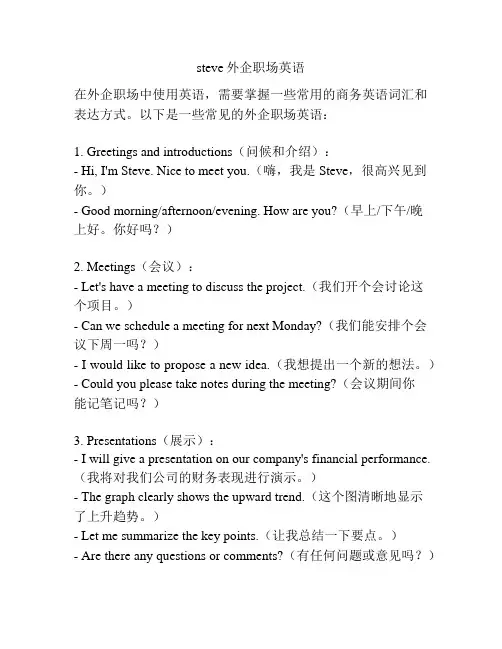
steve外企职场英语在外企职场中使用英语,需要掌握一些常用的商务英语词汇和表达方式。
以下是一些常见的外企职场英语:1. Greetings and introductions(问候和介绍):- Hi, I'm Steve. Nice to meet you.(嗨,我是Steve,很高兴见到你。
)- Good morning/afternoon/evening. How are you?(早上/下午/晚上好。
你好吗?)2. Meetings(会议):- Let's have a meeting to discuss the project.(我们开个会讨论这个项目。
)- Can we schedule a meeting for next Monday?(我们能安排个会议下周一吗?)- I would like to propose a new idea.(我想提出一个新的想法。
)- Could you please take notes during the meeting?(会议期间你能记笔记吗?)3. Presentations(展示):- I will give a presentation on our company's financial performance.(我将对我们公司的财务表现进行演示。
)- The graph clearly shows the upward trend.(这个图清晰地显示了上升趋势。
)- Let me summarize the key points.(让我总结一下要点。
)- Are there any questions or comments?(有任何问题或意见吗?)4. Negotiations(谈判):- We would like to negotiate the terms of the contract.(我们想谈判合同条款。
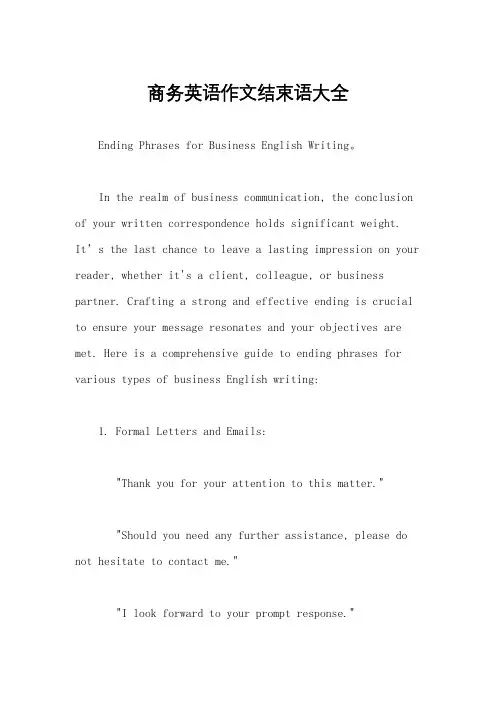
商务英语作文结束语大全Ending Phrases for Business English Writing。
In the realm of business communication, the conclusion of your written correspondence holds significant weight. It’s the last chance to leave a lasting impression on your reader, whether it's a client, colleague, or business partner. Crafting a strong and effective ending is crucial to ensure your message resonates and your objectives are met. Here is a comprehensive guide to ending phrases for various types of business English writing:1. Formal Letters and Emails:"Thank you for your attention to this matter.""Should you need any further assistance, please do not hesitate to contact me.""I look forward to your prompt response.""Thank you for your cooperation.""Best regards,""Yours sincerely,"2. Business Proposals:"I am confident that this proposal aligns with your objectives and will bring mutual benefit.""I am eager to discuss this proposal further at your earliest convenience.""Thank you for considering this proposal.""I am excited about the prospect of working together.""I am at your disposal to provide any additional information you may require."3. Reports and Presentations:"In conclusion, the findings of this report indicate...""I believe these insights will prove valuable in guiding future decisions.""Thank you for your time and attention during this presentation.""I am available to discuss any aspects of this report in more detail.""Looking forward to implementing the recommendations outlined in this report."4. Sales and Marketing Materials:"Don’t miss out on this opportunity. Contact us today to learn more.""Act now to take advantage of this limited-time offer.""Join the ranks of satisfied customers who have benefited from our products/services.""Invest in success. Invest in [Your Company Name].""Let us help you achieve your business goals."5. Job Applications and Cover Letters:"I am enthusiastic about the possibility of contributing to [Company Name].""Thank you for considering my application.""I am eager to discuss how my skills and experiences align with the needs of your team.""I look forward to the opportunity to interview withyou.""Thank you for your time and consideration."6. Meetings and Negotiations:"I believe we have reached a mutually beneficial agreement.""Thank you for your flexibility and willingness to collaborate.""I look forward to seeing our plans come to fruition.""Let’s keep the lines of communication open as we move forward.""Thank you for a productive meeting."7. General Business Communication:"In conclusion, I am confident that...""Thank you for your attention to detail.""I appreciate your time and consideration.""Let’s work together to achieve our shared goals." "Looking forward to our continued partnership."Remember, the ending of your business communication is your final opportunity to leave a positive impression. Choose your words wisely to reinforce your message and leave a lasting impact on your reader.。
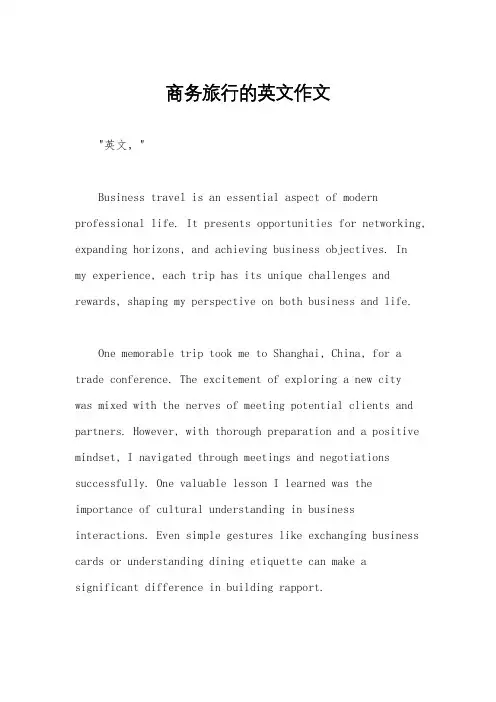
商务旅行的英文作文"英文,"Business travel is an essential aspect of modern professional life. It presents opportunities for networking, expanding horizons, and achieving business objectives. Inmy experience, each trip has its unique challenges and rewards, shaping my perspective on both business and life.One memorable trip took me to Shanghai, China, for a trade conference. The excitement of exploring a new citywas mixed with the nerves of meeting potential clients and partners. However, with thorough preparation and a positive mindset, I navigated through meetings and negotiations successfully. One valuable lesson I learned was the importance of cultural understanding in business interactions. Even simple gestures like exchanging business cards or understanding dining etiquette can make asignificant difference in building rapport.中文:商务旅行是现代职业生活中不可或缺的一部分。
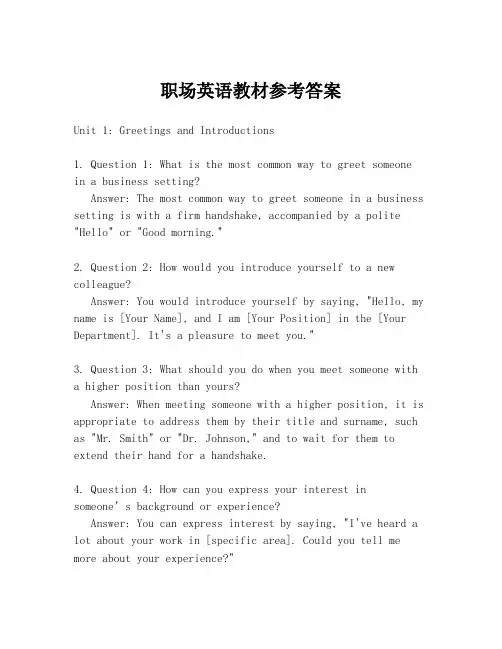
职场英语教材参考答案Unit 1: Greetings and Introductions1. Question 1: What is the most common way to greet someonein a business setting?Answer: The most common way to greet someone in a business setting is with a firm handshake, accompanied by a polite "Hello" or "Good morning."2. Question 2: How would you introduce yourself to a new colleague?Answer: You would introduce yourself by saying, "Hello, my name is [Your Name], and I am [Your Position] in the [Your Department]. It's a pleasure to meet you."3. Question 3: What should you do when you meet someone witha higher position than yours?Answer: When meeting someone with a higher position, it is appropriate to address them by their title and surname, such as "Mr. Smith" or "Dr. Johnson," and to wait for them to extend their hand for a handshake.4. Question 4: How can you express your interest in someone’s background or expe rience?Answer: You can express interest by saying, "I've heard a lot about your work in [specific area]. Could you tell me more about your experience?"5. Question 5: What is a polite way to end a conversation?Answer: A polite way to end a conversation is to say, "It was great talking to you. I hope we can continue this conversation soon."Unit 2: Meetings and Conferences1. Question 1: What is the purpose of an agenda in a meeting? Answer: The purpose of an agenda is to outline the topics to be discussed, the order in which they will be addressed, and the time allocated for each item.2. Question 2: How can you prepare for a meeting effectively? Answer: To prepare effectively for a meeting, review the agenda beforehand, gather relevant materials, and come prepared with notes or questions to contribute to the discussion.3. Question 3: What does it mean to "take minutes" during a meeting?Answer: To "take minutes" during a meeting means to record the main points discussed, decisions made, and actions agreed upon.4. Question 4: How can you contribute to a meeting without dominating the conversation?Answer: You can contribute by listening actively, waiting for appropriate moments to speak, and offering concise and relevant comments or questions.5. Question 5: What is the best way to handle disagreementsin a meeting?Answer: The best way to handle disagreements is to remain respectful, focus on the issue rather than personal attacks, and seek to find common ground or compromise.Unit 3: Business Correspondence1. Question 1: What are the key elements of a formal business email?Answer: Key elements of a formal business email includethe sender's and recipient's contact information, a subject line, a greeting, the body of the message, a closing, and a signature.2. Question 2: How can you write a polite request in an email? Answer: To write a polite request, start with a courteous greeting, clearly state the request, provide any necessary details, express gratitude, and end with a polite closing.3. Question 3: What is the purpose of a subject line in an email?Answer: The purpose of a subject line is to briefly summarize the content of the email, allowing the recipient to prioritize and understand the importance of the message.4. Question 4: How can you write a professional closing for a business email?Answer: A professional closing should be courteous and appropriate for the context, such as "Best regards," "Sincerely," or "Kind regards," followed by your name and contact information.5. Question 5: What should you do if you need to write an email to someone you do not know?Answer: If writing to someone you do not know, research their name and position, address them appropriately, and ensure your email is professional, concise, and respectful.Unit 4: Negotiations and Agreements1. Question 1: What is the primary goal of a negotiation?Answer: The primary goal of a negotiation is to reach a mutually beneficial agreement that satisfies the interests of all parties involved.2. Question 2: How can you prepare for a negotiation?Answer: To prepare for a negotiation, research the other party's interests and priorities, set clear objectives, and develop strategies for presenting your case and responding to counterarguments.3. Question 3: What is an effective way to handle a counteroffer?Answer: An effective way。
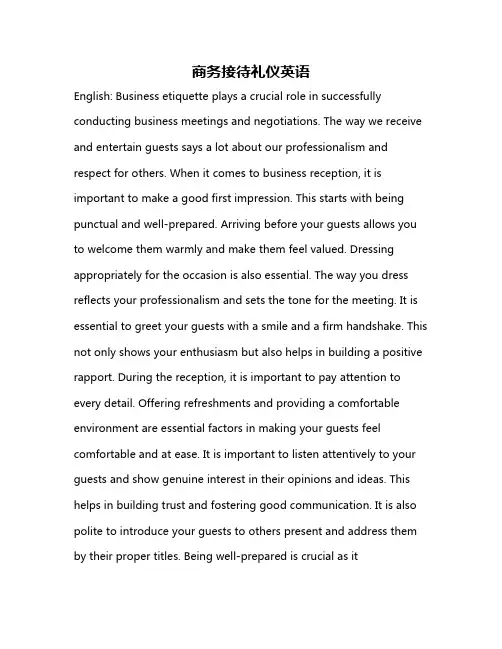
商务接待礼仪英语English: Business etiquette plays a crucial role in successfully conducting business meetings and negotiations. The way we receive and entertain guests says a lot about our professionalism and respect for others. When it comes to business reception, it is important to make a good first impression. This starts with being punctual and well-prepared. Arriving before your guests allows you to welcome them warmly and make them feel valued. Dressing appropriately for the occasion is also essential. The way you dress reflects your professionalism and sets the tone for the meeting. It is essential to greet your guests with a smile and a firm handshake. This not only shows your enthusiasm but also helps in building a positive rapport. During the reception, it is important to pay attention to every detail. Offering refreshments and providing a comfortable environment are essential factors in making your guests feel comfortable and at ease. It is important to listen attentively to your guests and show genuine interest in their opinions and ideas. This helps in building trust and fostering good communication. It is also polite to introduce your guests to others present and address them by their proper titles. Being well-prepared is crucial as itdemonstrates your commitment to the meeting. It is also importantto use appropriate language and avoid using jargon or technical terms that might be confusing for your guests. Lastly, it is essentialto express your gratitude and appreciation for the time and effort your guests have invested. This can be done by sending a thank-you note or follow-up email, expressing your pleasure in meeting them and discussing the matters at hand. Business reception etiquette is not only about following a set of rules but also about making your guests feel valued and respected. By paying attention to details and showing genuine interest, you can establish strong relationships and contribute to the success of your business.中文翻译: 商务礼仪在成功地进行商务会议和谈判方面起到至关重要的作用。
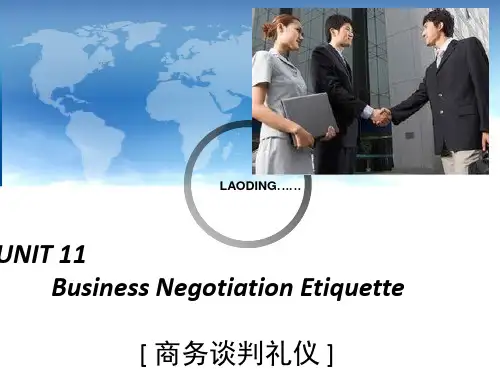
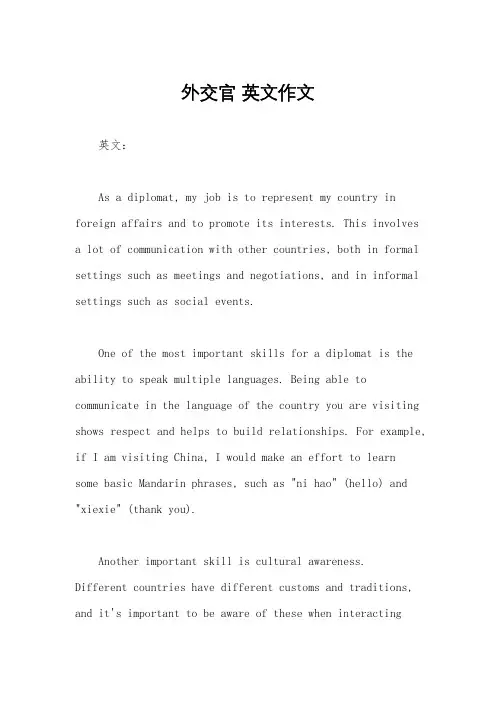
外交官英文作文英文:As a diplomat, my job is to represent my country in foreign affairs and to promote its interests. This involves a lot of communication with other countries, both in formal settings such as meetings and negotiations, and in informal settings such as social events.One of the most important skills for a diplomat is the ability to speak multiple languages. Being able to communicate in the language of the country you are visiting shows respect and helps to build relationships. For example, if I am visiting China, I would make an effort to learn some basic Mandarin phrases, such as "ni hao" (hello) and "xiexie" (thank you).Another important skill is cultural awareness.Different countries have different customs and traditions, and it's important to be aware of these when interactingwith people from other cultures. For example, in some cultures it's considered rude to show the soles of your feet, so I would avoid crossing my legs in a way that exposes the bottom of my shoe.In addition to language and cultural skills, diplomacy also requires a lot of patience and tact. Negotiations can be long and difficult, and it's important to remain calm and professional even when faced with challenging situations. For example, if I am negotiating a trade deal and the other party is being difficult, I would try to find common ground and work towards a compromise.Overall, being a diplomat requires a combination of language skills, cultural awareness, and diplomacy. It's a challenging but rewarding job that allows me to represent my country on the world stage.中文:作为一名外交官,我的工作是代表我的国家参与外交事务并促进其利益。
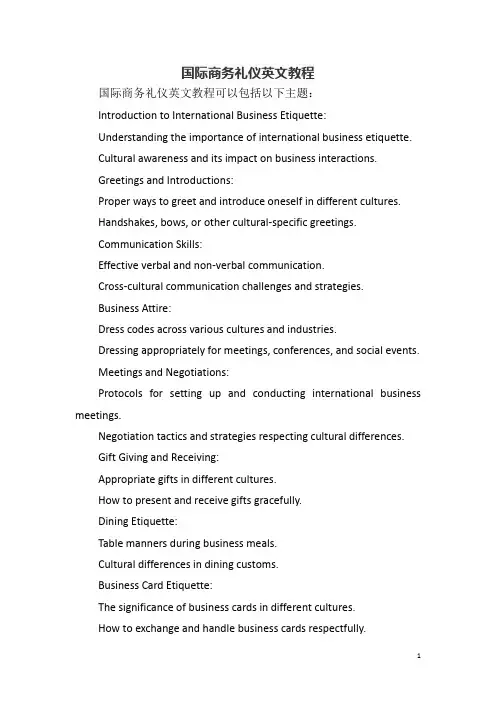
国际商务礼仪英文教程国际商务礼仪英文教程可以包括以下主题:Introduction to International Business Etiquette:Understanding the importance of international business etiquette.Cultural awareness and its impact on business interactions.Greetings and Introductions:Proper ways to greet and introduce oneself in different cultures.Handshakes, bows, or other cultural-specific greetings.Communication Skills:Effective verbal and non-verbal communication.Cross-cultural communication challenges and strategies.Business Attire:Dress codes across various cultures and industries.Dressing appropriately for meetings, conferences, and social events.Meetings and Negotiations:Protocols for setting up and conducting international business meetings.Negotiation tactics and strategies respecting cultural differences.Gift Giving and Receiving:Appropriate gifts in different cultures.How to present and receive gifts gracefully.Dining Etiquette:Table manners during business meals.Cultural differences in dining customs.Business Card Etiquette:The significance of business cards in different cultures.How to exchange and handle business cards respectfully.Cultural Sensitivity:Recognizing and respecting cultural nuances.Avoiding cultural faux pas in a global business environment.Travel Etiquette:Tips for international travel related to business.Adapting to different time zones and jet lag.Socializing and Networking:Building relationships in a global business context.Appropriate behavior at social events and networking functions.Follow-up and Thank You Notes:Sending timely and culturally appropriate thank-you notes.Importance of follow-up after business meetings or negotiations.这些建议可作为国际商务礼仪英文教程的主要主题,帮助个人在跨文化商务环境中更加成功地交往。
Hungry for your love那是在1942年的一个漆黑而寒冷的冬天,与在纳粹集中营的其他日子里一样没有任何区别,裹着破布,在冬日里瑟瑟发抖,依然无法相信这噩梦般的一切。
我只是一个年轻的男孩,我应该和朋友们一起玩耍,一起上学,憧憬美好的未来,长大,结婚,有一个属于我的家庭。
但是,对于眼前这一切来说,那些都是梦而已,我不再向往他们。
取而代之的是,我即将死去,自从我被从自己的家乡带着这来后,每天每小时都苟延残喘,我明天还会活着吗?是否今晚就会被带进毒气室呢?我在铁丝网附近来回走着,试图让瘦弱的身体暖和起来。
我很饿,已经记不起来何时有饥饿感了。
可以吃的东西似乎只是一个梦而已。
每一天,随着我们中人数的减少,那些过去的欢乐时间似乎仅仅是一场梦而已,于是我陷入了越来越深的绝望当中。
突然,我注意到,一个年轻的女孩正经过铁丝网的那端。
她停住脚步,用一双带有哀愁的目光看着我,似乎她也想告诉我,她理解我的处境,但是不晓得为何我会在这里。
我想把目光转移开,她这样看着我让我感到慕名奇妙的羞愧,但是,我又无法转移我的目光。
就在那时,她把手伸进口袋,拿出了一个红苹果,一个漂亮的,闪着红光的苹果。
啊,从我上次见到它已近很久很久了!她警惕的左右环视了一下,然后面带着胜利的微笑,将苹果扔过了铁丝网。
我跑着接种到了苹果,用冻的发抖双手紧紧握住它。
在我死亡的世界里,这个苹果所传递出的的正是生命和爱。
我抬起头,注视着那个女孩消失在远处。
第二天,我无法控制住自己,在同一时间,来到了靠近栅栏的地方。
是我疯了,希望她能再次出现吗?当然,就在此处,我必须抓住任何微小的希望,因为她给了我希望,所以,我必须要牢牢抓紧它。
她当真再次来了,并且,再次给我带来了一个苹果,面带着微笑,将苹果扔过铁丝网。
这次,我接住了苹果,并且把它举起,以便能让那个女孩看到。
她的眼睛在闪烁,是在同情我吗?或许,但是,我不敢肯定。
我只是感到这样注视着她是如此的幸福。
英语一与英语二作文English Composition 1。
The Importance of Learning English。
English has become the most widely spoken language in the world and is the official language of over 50 countries. It is the language of international business, science, technology, and entertainment. Therefore, learning Englishis essential for anyone who wants to succeed in today's globalized world.Firstly, English is the language of international communication. It is the language used in international conferences, meetings, and negotiations. If you want to communicate with people from different countries, you needto learn English. Moreover, English is the language of the internet, which means that you can access a wealth of information online if you know English.Secondly, English is the language of business. Many multinational companies require their employees to speak English, and knowing English can increase your chances of getting a good job. In addition, English is the language of international trade, and if you want to do business with people from other countries, you need to be able to speak English.Thirdly, English is the language of science and technology. Most scientific and technical journals are published in English, and many conferences and seminars are conducted in English. Knowing English can help you keep up with the latest developments in your field and communicate with other professionals.Finally, English is the language of entertainment. Most movies, TV shows, and music are produced in English, and if you want to enjoy them, you need to understand English. Moreover, knowing English can help you appreciate the cultures of English-speaking countries and make new friends from around the world.In conclusion, learning English is essential for anyone who wants to succeed in today's globalized world. It is the language of international communication, business, science, technology, and entertainment. Therefore, if you want to improve your chances of success, you need to learn English.。
Unit11 topic talkinglesson2单词讲义negotiate词性:动词中文意思:谈判,协商英文释义:to discuss and make decisions about something in an attempt to reach an agreement 词源:来自拉丁语negotiare,意为“讨论事务”例句:We need to negotiate with the management to get better working conditions.固定搭配:negotiate a deal, negotiate a contract, negotiate terms近义词:bargain, discuss, mediatepromise词性:名词/动词中文意思:妥协,折中英文释义:a settlement of a dispute that is reached by each side making concessions词源:来自荷兰语kompromitten,意为“共同让步”例句:They reached a promise after hours of negotiation.固定搭配:reach a promise, make a promise, promise on something近义词:settlement, concession, tradeoffinquire词性:动词中文意思:询问,打听英文释义:to ask someone for information or details about something词源:来自拉丁语inquirere,意为“调查,查问”例句:I will inquire about the meeting time with my boss.固定搭配:inquire about, inquire into, inquire something from someone近义词:ask, question, seek informationresolve词性:动词中文意思:解决,决心,决定英文释义:to find an answer or solution to a problem or difficulty; to make a firm decision ordetermination词源:来自拉丁语resolvere,意为“分解,分析”例句:We need to resolve this issue as soon as possible.固定搭配:resolve a conflict, resolve a problem, resolve to do something近义词:solve, determine, decideannoying词性:形容词中文意思:令人烦恼的,讨厌的英文释义:causing irritation or annoyance; bothersome or tiresome词源:来自古英语onnian,意为“使烦恼”例句:The constant noise from the construction site was really annoying.固定搭配:annoying habit, annoying behavior, be annoying to someone近义词:irritating, bothersome, vexinginconvenience词性:名词中文意思:不便,麻烦英文释义:the state of being unfortable, troubled or not able to do what you want to do 词源:来自拉丁语的inconvenientia,意为“不方便”例句:I apologize for any inconvenience caused by the delay.固定搭配:cause/bring inconvenience to sb./sth.给某人/某物带来不便近义词:trouble, disfort, botherdetect词性:动词中文意思:发现,察觉英文释义:to notice or find something that is not obvious词源:来自拉丁语的detectus,意为“揭露,暴露”例句:The police were unable to detect any signs of forced entry.固定搭配:detect sth./sb. (doing) sth.发现某人/某物在做某事近义词:spot, notice, perceivesomewhat词性:副词中文意思:稍微,有点英文释义:to a certain extent; fairly; rather词源:来自古英语的summere,意为“稍微,有点”例句:I'm somewhat tired after the long journey.固定搭配:somewhat of a...有点……的人或事物近义词:a bit, slightly, kind ofannoy词性:动词中文意思:使烦恼,使恼怒英文释义:to make someone feel annoyed or angry词源:来自古法语的anoier,意为“使烦恼”例句:The noise from the construction site was beginning to annoy me.固定搭配:be annoyed with sb./sth.对某人/某事感到烦恼近义词:irritate, bother, vexashamed词性:形容词中文意思:感到羞耻的,惭愧的英文释义:feeling embarrassed or guilty about something you have done or failed to do词源:来自古英语的gesceap,意为“感到羞耻”例句:He felt ashamed of his behavior at the party.固定搭配:be ashamed of sth./doing sth.为某事/做某事感到羞耻近义词:embarrassed, guilty, remorsefulMaturity词性:名词中文意思:成熟,到期英文释义:the quality or state of being fully developed or grown词源:来自拉丁语"maturitas",意为"成熟"例句:The maturity of the fruit is determined by its color.(水果的成熟程度由其颜色决定。
谈谈你的业务生活英语作文英文回答:As a business professional, I often find myself immersed in the world of English in my daily work. From communicating with international clients to writing reports and presentations, English plays a crucial role in my business life.One aspect of my business life where English is essential is in meetings and negotiations. In these situations, I need to be able to express my ideas clearly and persuasively. For example, I may need to present a proposal to a potential client, outlining the benefits and advantages of our product or service. In such cases, I rely on my English language skills to effectively communicate the value proposition and convince the client to choose our company.Another important area where English is crucial is inwritten communication. Whether it's composing emails, drafting contracts, or preparing marketing materials, I need to ensure that my written English is accurate and professional. This requires not only a good command of grammar and vocabulary but also an understanding of the cultural nuances and business etiquette associated with English-speaking countries.Furthermore, English proficiency is essential when conducting market research and analyzing industry trends. Many of the resources and reports available in my field are in English, so being able to comprehend and extract relevant information is vital. This allows me to stay updated on the latest developments and make informed business decisions.In addition to the practical aspects of using Englishin my business life, there are also personal benefits. Being able to communicate effectively in English opens up opportunities for career advancement and international collaborations. It also helps me build relationships with colleagues and clients from diverse backgrounds, fosteringa sense of inclusivity and understanding.中文回答:作为一名商务专业人士,我经常发现自己在日常工作中沉浸在英语的世界中。
最重要的原因是英语作文The Most Important Reason Why English is Important。
English is a global language that is spoken by millions of people around the world. It is the most widely used language in international business, education, and communication. There are many reasons why English is important, but the most important reason is that it is the key to success in today's world.Firstly, English is the language of international business. In today's globalized economy, businesses need to communicate with customers, suppliers, and partners from different countries. English is the language that is usedin most international business transactions. If you want to succeed in business, you need to be able to speak and write in English.Secondly, English is the language of education. Many of the world's top universities use English as the language ofinstruction. If you want to study at one of these universities, you need to be able to speak and write in English. Even if you don't plan to study at a top university, you still need to be able to read and understand English textbooks and academic papers.Thirdly, English is the language of communication. If you want to travel to different countries, you need to be able to speak and understand English. English is also the language that is used in international conferences, meetings, and negotiations. If you want to be able to communicate effectively with people from different countries, you need to be able to speak and write in English.In conclusion, English is the key to success in today's world. It is the language of international business, education, and communication. If you want to succeed in these areas, you need to be able to speak and write in English. Therefore, it is important to learn English and to continue to improve your English skills.。